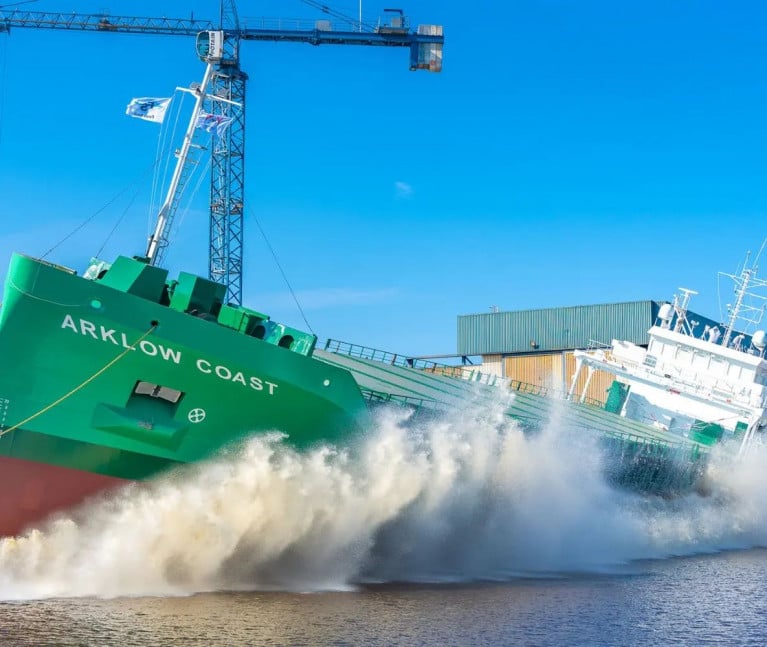Displaying items by tag: 'Coaster' first
Newbuild Short-Sea 'Coaster' Brings to Eight Out of Ten C-Class Cargoships for Arklow Shipping
Once again the newest C-class series of short-sea traders for Arklow Shipping, launched in a shipyard in The Netherlands, has been given a ship name first for the Co. Wicklow based shipowner, writes Jehan Ashmore.
On this occasion, Saturday's launch of the 5,054dwat newbuild saw the Arklow Coast take to the waters of the Winschoterdiep canal at Ferus Smit's shipyard at Westerbroek.
The new 87m cargoship will further modernise ASL's almost 60-strong Irish-Dutch flagged fleet, that includes deep sea ocean going bulkers, the largest been a pair of S-class, each of 34,905dwat. In addition to the dwindling R-class of 4,933dwat. Among them the oldest, Arklow Rainbow which Afloat observed depart Dublin Port last week when bound to Northfleet, London.
As for the new Irish-flagged C-Class cargoships, they are given names beginning with the letter 'C'. Such newly created names having differred to previous generations of tonnage dating back to the 1980's. An exception to the nomenclature has been Arklow Castle (see 'European' trader) which follows two predecessors taking this same name.
The previous 'Castle' built for ASL and dating to 1996, was notably a 'containership' which is a rarity for ASL operations, having served a 'liner' service linking the UK, Ireland and Spain. This lo-lo link was discontinued following ASL's disposal of the 532TEU capacity containership.
Whereas, the original Arklow Castle built in 1981 was secondhand tonnage for ASL, until its career ended dramatically when it became wrecked more than a decade later at Sables d'Olonne on the west coast of France.
As for the current Arklow Coast, which represents the 8th of 10 C-class cargoships ordered by ASL and follows Arklow Cloud which Afloat reported late last year also launched at Westerbroek.
A maximized single hold equates to a volume of 220,000 cft and a carrying capacity over 5000 deadweight tons. The newbuild has been given a 1A ice class notation and is propelled by a 1,740 kW MaK engine with a single ducted propeller.
The straight-stemmed bow is equipped with a 275kW electric bowthruster to assist operations in port. Related to that Afloat today tracked several of the C-class cargoships located to ports in north-west Europe, the Baltic Sea and trading in the western Mediterranean.





























































